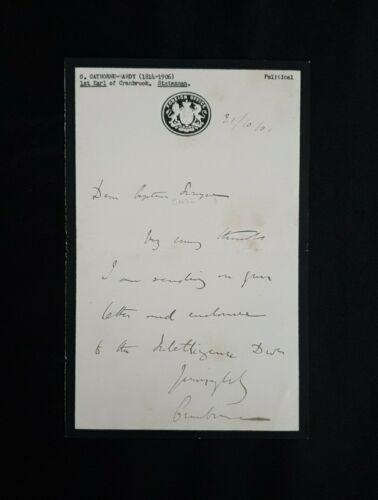-40%
Rare Royalty Earl of Cranbrook Foreign Office UK Royal Document Signed Autograph
$ 65.97
- Description
- Size Guide
Description
For your consideration is an exceedingly rare and important c.1901 1st Earl of Cranbrook, G. Gathorne-Hardy Signed / Autographed Letter on UK / British Foreign Office government letterhead. Guaranteed original and authentic. Size of letter is approximately 5" x 8".Gathorne Gathorne-Hardy, 1st Earl of Cranbrook, GCSI, PC (1 October 1814 – 30 October 1906), known as Gathorne Hardy until 1878, was a prominent British Conservative politician, a moderate, middle-of-the road Anglican. He held cabinet office in every Conservative government between 1858 and 1892 and notably served as Home Secretary from 1867 to 1868 and as Secretary of State for War from 1874 to 1878.
Gathorne Hardy was the third son of John Hardy, of the Manor House Bradford, and Isabel, daughter of Richard Gathorne. His father was a barrister, the main owner of the Low Moor ironworks and also represented Bradford in Parliament; his ancestors had been attorneys and stewards to the Spencer-Stanhope family of Horsforth since the beginning of the 18th century. He was educated at Shrewsbury School and Oriel College, Oxford, and was called to the Bar, Inner Temple, in 1840. He established a successful legal practice on the Northern Circuit, being based at Leeds, but was denied when he applied for silk in 1855.




















